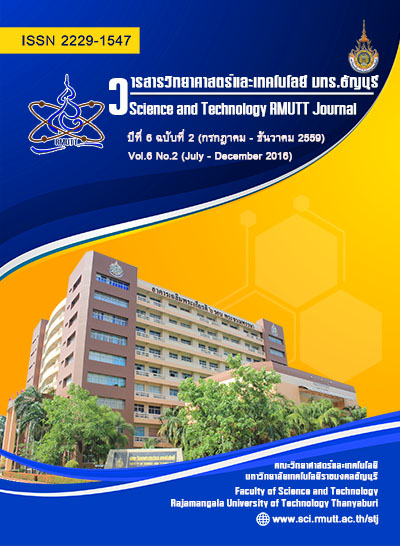Development of Hybrid Algorithm Model for Students’ Achievement Forecasting
Main Article Content
Abstract
In this research, development of hybrid algorithm model by combination of causal forecasting methods using genetic algorithm and neural network and fuzzy logic is proposed for students’ achievement forecasting. The students’ learning achievement data set between the years 2013-2015 was used. The author selected 1,320 students’ grade: 660 for training and 660 for testing. From the results, the developed model can predict the most possible values that compare to the real values of both training data and testing data. A fuzzy rules system with 4 rules was generated by hybrid algorithm and had RMSE = 0.024 in the training data. The resulted fuzzy rules system produced RMSE = 0.087 on the testing data.
Article Details
References
อ. อภิชาตบรรลือ. เอกสารประกอบการสอนรายวิชาการวัดและประเมินผลทางการศึกษา. กรุงเทพมหานคร : ภาควิชาครุศาสตร์เครื่องกล คณะครุศาสตร์อุตสาหกรรม มหาวิทยาลัยเทคโนโลยีพระจอมเกล้า พระนครเหนือ. 2553
Saleh, I. and S.-i. Kim, A fuzzy system for evaluating students’ learning achievement. Expert Systems with Applications, 2009. 36(3, Part 2): p. 6236-6243.
Shyi-Ming, C. and L. Ting-Kuei. A new method to evaluate students' learning achievement by automatically generating the importance degrees of attributes of questions. in Machine Learning and Cybernetics (ICMLC), 2010 International Conference on. 2010.
Hameed, I.A., Using Gaussian membership functions for improving the reliability and robustness of students’ evaluation systems. Expert Systems with Applications, 2011. 38(6): p. 7135-7142.
Ingoley, S.N. and P.D. J.W. Bakal, Evaluating Students’ Performance using Fuzzy Logic.International Conference in Recent Trends in Information Technology and Computer Science (ICRTITCS - 2012).Proceedings published in International Journal of Computer Applications® (IJCA) (0975 – 8887).
Ingoley, S.N. and J.W. Bakal. Evaluating students' performance using four-node fuzzy controller. in Engineering (NUiCONE), 2013 Nirma University International Conference on. 2013.
Ingoley, S.N. and J.W. Bakal. A novel method for inferring strict and lenient marks into normal marks using fuzzy logic. in Engineering (NUiCONE), 2013 Nirma University International Conference on. 2013.
Sakthivel, E., K.S. Kannan, and S. Arumugam, Optimized Evaluation of Students Performances Using Fuzzy Logic. International Journal of Scientific & Engineering Research, 2013. 4(9): p. 6.
Zukhri, Z. and Omar, K., Solving new student allocation problemwith genetic algorithm: a hard problem for partition based approach. Int. J. Soft Comput. Appl., 2008, 2, 6–15.
Mankad, K., Sajja, P. S. and Akerkar, R., Evolving rules using genetic fuzzy approach: an educational case study. Int. J. Soft Comput., 2011, 2(1), 35–46.
Arsad, P.M., N. Buniyamin, and J.l.A. Manan. Neural network model to predict electrical students' academic performance. in Engineering Education (ICEED), 2012 4th International Congress on. 2012.
R.-S. Yadav, P. Ahmed, A.-K. Som, and S. Pal, “Acadamic performance evaluation usng soft computing techniques” CURRENT SCIENCE, vol. 106, no. 11, pp. 1505-1517, 2014.
L. A. Sadeh, “Fuzzy sets,” Information and Control, vol. 8, no. 3, pp. 338-353, June 1965.
พ. มีสัจ, ระบบฟัซซีและโครงข่ายประสาทเทียม. เอกสารประกอบการสอน, คณะเทคโนโลยีสารสนเทศ, มหาวิทยาลัยเทคโนโลยีพระจอมเกล้าพระนครเหนือ, 2551.
O. yildiz, A. Bal, S. Gulsecen and F. D. Kentli, "A Genetic-Fuzzy Based Mathematical Model to Evaluate The Distance Education Students’ Academic Performance". Procedia - Social and Behavioral Sciences, 2012. 55(0): p. 409-418.
Yuill, W., et al. Application of Adaptive Neuro Fuzzy Inference System (ANFIS) based short term load forecasting in South African power networks. in Universities Power Engineering Conference (UPEC), 2010 45th International. 2010.
K. Yan, C. and T.S. Dillon. Traffic flow prediction using orthogonal arrays and Takagi-Sugeno neural fuzzy models. in Neural Networks (IJCNN), 2014 International Joint Conference on. 2014.
Zhou, H., X.H. Wu, and X.G. Li. An ANFIS model of electricity price forecasting based on subtractive clustering. in Power and Energy Society General Meeting, 2011 IEEE. 2011.
Fazlic, L.B. and A. Avdagic. Prediction of lung nicotine concentration based on novel GA-ANFIS system approach. in Information, Communication and Automation Technologies (ICAT), 2015 XXV International Conference on. 2015.


